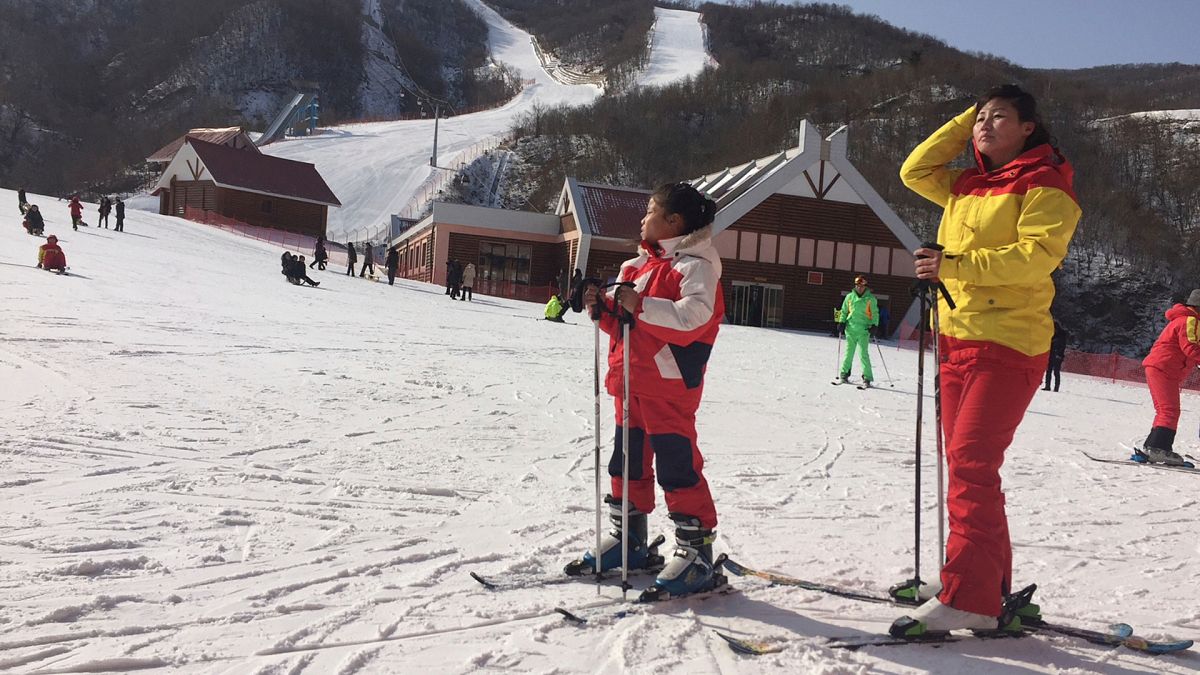


The four-day trip will take place in February and features a stop in Pyongyang before skiing at North Korea’s most modern resort.
Russian tourists could be the first international travellers to visit North Korea since the country’s borders closed in January 2020 amid the global COVD-19 lockdown.
News of the ski trip was published by the Russian state-run Tass news agency and advertised by a Vladivostok-based Russian tour agency this week.
Scheduled for February the tour came as a surprise to those who had expected the first post-pandemic tourists to North Korea to come from China, the North’s biggest diplomatic ally and economic pipeline.
The webpage of the tour agency, Vostok Intur, says the four-day trip is to start on 9 February. The package costs $750 (€685) per person, according to Tass and the tour agency.
According to a Tass report on Wednesday, an unspecified number of tourists from Russia’s far eastern region of Primorye will first fly to the North Korean capital, Pyongyang.
There they will visit monuments such as the “Tower of Juche Idea,” named after the North’s guiding philosophy of “juche” or self-reliance.
The tourists will then travel on to the North’s Masik Pass on the east coast, where the country’s most modern ski resort is located, Tass said.
“In (Masik Pass), you will find yourself in a real paradise for winter sports lovers!” the blurb of the tour agency gushes.
“Here you will find incredible slopes with different levels of difficulty that will satisfy the needs of both experienced skiers and beginners.”
Tass said the trip was arranged under an agreement reached between Oleg Kozhemyako, governor of the Primorye region, and North Korean authorities.
Kozhemyako travelled to Pyongyang in December for talks on boosting economic ties. Ahead of the trip, he told Russian media he expected to discuss tourism, agriculture and trade cooperation.
North Korea has been slowly easing pandemic-era curbs and opening its international borders as part of its efforts to revive its economy devastated by the lockdown and persistent US-led sanctions.
In August, South Korea’s spy service told lawmakers that North Korea’s economy shrank each year from 2020 to 2022 and that its gross domestic product last year was 12 per cent less than in 2016.
“For North Korea, tourism is the easiest way to earn foreign currency under the international sanctions regime,” said Koh Yu-hwan, former president of Seoul’s Korea Institute for National Unification. He said he expects Pyongyang to eventually also open North Korea to Chinese tourists.
Lim Eul-chul, a professor at Kyungnam University’s Institute for Far Eastern Studies in Seoul, said that North Korea’s receiving Russian tourists before Chinese ones proves again Kim Jong Un is focusing on bolstering partnerships with Russia.
He said North Korea and Russia are expected to expand their cooperation in other sectors.
But the resumption of Chinese travel will still likely serve as a much larger source of revenue as tourists from the country accounted for about 90 per cent of the total international visitors to North Korea before the pandemic.
In 2019, a record number of about 300,000 foreign tourists visited North Korea, resulting in North Korea earning between $90 million and $150 million (€82 million and €137 million), experts say.
“Visitors from Russia are unlikely to be as financially lucrative for North Korea as the return of more numerous visitors from China,” Leif-Eric Easley, a professor at Ewha University in Seoul, said.
It’s still unclear how fast North Korea will expand its international tourism as Kim is tightening control of his 26 million people in the face of economic hardships and security tensions with the United States.
North Korea, a country with poor public health infrastructure, likely remains wary of infectious diseases as well, observers say.
Lim said North Korea will likely further open its borders in “a considerably limited and gradual manner.”
“For the Kim regime, international tourists risk ideological pollution as much as they promise economic benefits,” Easley added.